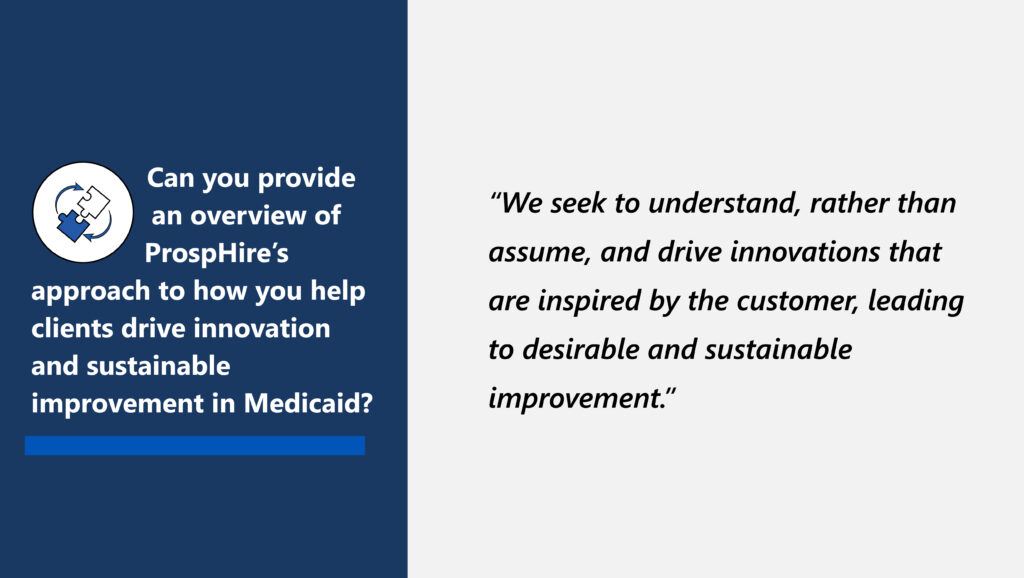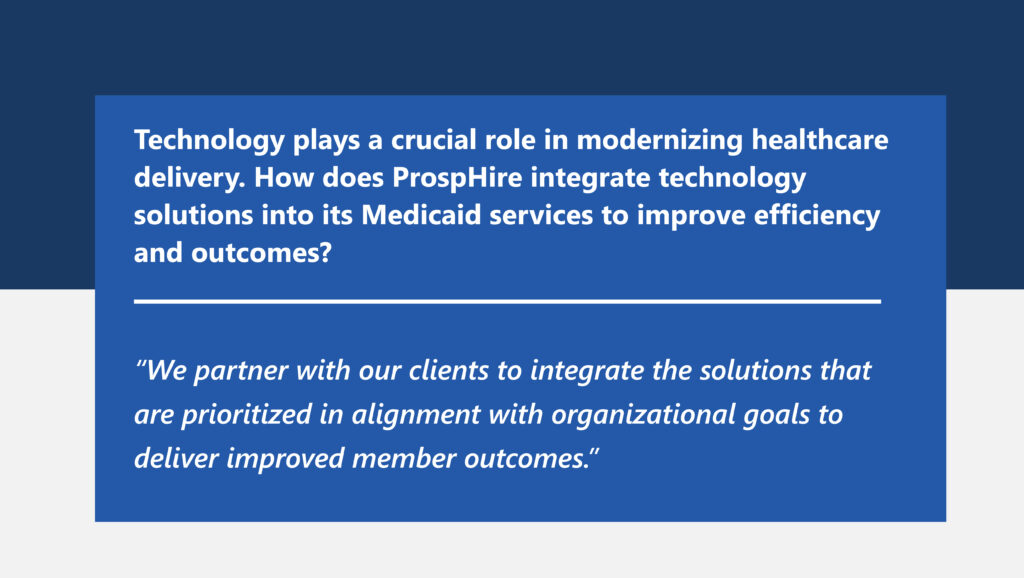Q&A with ProspHire’s Julie Evans on Medicaid
Let’s have a conversation
The Medicaid population is one of healthcare’s most vulnerable populations requiring unique, frequent and customized delivery of care to provide the resources and services necessary to address health disparities. This leads to significant challenges for care providers in navigating the continuously evolving and regionally unique Medicaid environment. With escalating pressure to contain costs, adapt to Medicaid expansion, address health equity and social risk factors and improve quality performance, the call for effective strategies has never been more pressing.
At ProspHire, our team of Medicaid specialists and project executors offers innovative solutions tailored to the needs of federal and state healthcare agencies, Medicaid health insurers, health systems and pharmacy benefit managers. In this Q&A session, we engage with our Medicaid Practice Leader Julie Evans to dive into various topics spanning delivery, implementation, operations, organization, strategy and technology, offering insights and expertise to address the complexities of the Medicaid landscape.
Can you provide an overview of ProspHire’s approach to how you help clients drive innovation and sustainable improvement in Medicaid?
One of ProspHire’s core values is relationships. As we seek to drive innovation and sustainable improvement in Medicaid, our first step is to understand each health plan’s unique population and regional priorities through relationships with Medicaid beneficiaries, customer facing teams and community-based providers.
State regulations and region-specific needs are the foundation of Medicaid services and pose unique guardrails for our clients. While state regulations are rigid and defined, region-specific needs vary and evolve leaving room for innovation. Through a customer-centered approach, we seek to understand, rather than assume, and drive innovations that are inspired by the customer, leading to desirable and sustainable improvement.
ProspHire partners with our clients to amplify the voice of the customer through the ideation and execution of their innovations by means of strategic initiatives in alignment with organizational priorities.

What are some of the most pressing challenges that healthcare organizations face in navigating Medicaid landscape, particularly considering recent regulatory changes?
The Covid-19 pandemic started 4 years ago, yet today we continue to see the continuous impact on the Medicaid population and landscape. The pandemic inspired an increased focus on health equity, as those affected by Social Determinants of Health, such as the Medicaid population, saw a compounded impact of the pandemic on health outcomes. Healthcare organizations have faced several challenges in appropriately addressing individual needs within the confines of their services and finances given the vast number of challenges impacting health outcomes.
Since the pandemic, we have seen a shift in policy expanding Medicaid coverage and access to care through Section 1115 waivers. Through the current administration, states are permitted to propose Section 1115 waivers focused on new approaches to reduce health disparities and expand coverage and benefits. As a Small Diverse Business (SDB) in Pennsylvania working alongside several of the state’s Medicaid Managed Care Organizations, we have had a particular interest in the pending Pennsylvania Keystones of Health submission.
The approval of the Pennsylvania Keystones of Health waiver focuses on the Social Determinants of Health to improve the health of Pennsylvanians through new and innovative programs. Ultimately, these provisions will funnel additional opportunities and implementation challenges through Managed Care Organizations whose beneficiaries will greatly benefit in the long-term.
How does ProspHire stay on top of the evolving Medicaid regulations and policies and how do you ensure your clients remain compliant?
Read, watch, listen and react. Like many of our clients, we stay up to date on the industry changes, trends and discussions to prepare ourselves and others to react to our evolving environment. This includes the ever-changing needs and priorities of the unique populations that make up a plan’s membership and there is no one who knows their membership better than our clients. Although it isn’t always the most fun activity, our attention to detail and quality assurance practices help us work in partnership with our clients and their legal and compliance teams to drive results.
Can you share a success story or case study where ProspHire’s Medicaid consulting services have significantly benefitted healthcare organizations?
It’s hard to choose just one… so I’ll have to give two. One is tied to a state-wide initiative in Pennsylvania focused on addressing health equity through a collaborative bringing together health systems, managed care organizations, community-based partners and other care providers. Our team facilitated the efforts to address health equity through regional population health assessments and intervention planning across stakeholder groups. This led to regional playbook development that was eventually adopted by the Department of Health for future state implementation. The opportunity to collaborate across healthcare organizations, build meaningful partnerships and drive patient-centered change was of benefit to those engaged in the collaborative and the communities to be impacted.
The second is an engagement that has been in existence almost as long as ProspHire, where we are partnered with a Medicaid Managed Care Organization’s quality team to provide project management services. By offering project management support, our team can support the planning, design and implementation of Medicaid Quality initiatives year-over-year, continuously collaborating with the client to drive improved health plan performance.
Medicaid expansion has brought significant changes in the healthcare industry. How does ProspHire assist clients with adapting to these changes and leveraging opportunities for growth?
Medicaid expansion, in addition to Medicaid unwinding, has led to a series of fluctuations in Medicaid membership. Since 2014, the Affordable Care Act opened the door to Medicaid expansion and many but not all states have taken the opportunity to do so. During the pandemic, continuous enrollment protections were put in place to maintain enrollment of and protect health coverage for almost all Medicaid enrollees. In April 2023, this condition was lifted, reverting states back to business as usual and causing all Medicaid enrollees to be reevaluated for eligibility.
Through these changes, ProspHire supports health plans prepare for scalability or sustainability through operations, improve member transition from Medicaid to marketplace or vice versa with a focus on continuity of care and continuously evaluate operating model and administrative costs as required.
For plans that are looking to enter the Medicaid market within a state or increase Medicaid enrollment through growth strategies, our team is equipped and prepared to support health plan expansion into new lines of business or regions. From operationalization to delivery, our industry knowledge and experience position us to support across all government programs.
Technology plays a crucial role in modernizing healthcare delivery. How does ProspHire integrate technology solutions into its Medicaid services to improve efficiency and outcomes?
Technology is continuously increasing in significance across healthcare delivery. Most recently, our team supported the integration of a new clinical platform to enhance care management, utilization management and reporting capabilities. From requirements gathering to go-live and post go-live risk management and resolutions, our team has been in the weeds, working alongside the client to deliver a multi-state clinical solution. This tool improves efficiency of workflows, decision making and ultimately the delivery of care to the Medicaid population and those who are most vulnerable to adverse health outcomes.
Plans have different technological needs depending on the current state of their operations and we partner with our clients to integrate the solutions that are prioritized in alignment with organizational goals to deliver improved member outcomes.

Can you talk about the importance of data analytics in Medicaid projects and how you use data-driven insights to inform decision-making and strategy development?
Social Determinants of Health (SDOH) and health equity are buzz-worthy terms that have led to a shift in the way specific care needs are identified and delivered. A challenge posed by SDOH and ultimately health equity, is the variation in need based on environmental factors. Through partnerships with community-based organizations and our clients, mutual goals can be achieved by addressing social needs and downstream health outcomes.
To do so, data analytics is crucial. Who is our population of focus? Where do they live? What impact will our intervention have? These are all questions that data can provide insight to. Knowing this, ProspHire has supported population health assessments and data dashboards focused on marrying publicly available data and internal clinical data to support data-driven decision making. These tools support strategic development and inform the who, what and where of many Medicaid projects, specifically those focused on quality.
With the rise of value-based care models, how do you assist clients in transitioning from fee-for-service to value-based reimbursement structures within the Medicaid space?
Pay for performance models, shared savings programs, patient centered medical homes, Medicaid ACOs… the many value-based care models, continue to evolve and demonstrate their effectiveness. Our focus is to support the readiness and feasibility of transition followed by the monitoring and controlling of care model commitments. The continuous need to reduce costs and deliver improved quality of care poses a challenge to both providers and payors and leads to the continuous need to reevaluate and refine our reimbursement structures.
Looking ahead, what trends do you anticipate shaping the future of Medicaid consulting and how is ProspHire positioned to address these trends proactively?
Although predictable to say, quality improvement and cost reduction are and will continue to be a focus in Medicaid. I anticipate that these competing priorities will continue to be an area of focus, but rather than feeling miles apart, will slowly feel more symbiotic.
Let’s use maternal morbidity and mortality as an example. The cost of maternal morbidity and mortality in the U.S. is tens of billions of dollars a year. The cost savings that would come from quality improvement are substantial and in the developed or industrialized world, we have the highest maternal mortality rate that continues to increase and inequitably impact black women. A priority such as this seems unquestionable.
As we continue to look at high-cost low-quality outcomes, we begin to see the vast opportunity for all. Our hope is to continuously be aware of and prepared to address these areas of need, evaluate trends, think innovatively and strategically and ultimately drive change for our clients and the Medicaid population.
ProspHire
216 Blvd of the Allies, Sixth Floor
Pittsburgh, PA 15222
412.391.1100
[email protected]
Quick Links
© 2024 ProspHire, LLC. All Rights Reserved / Terms of Use / Privacy Policy









